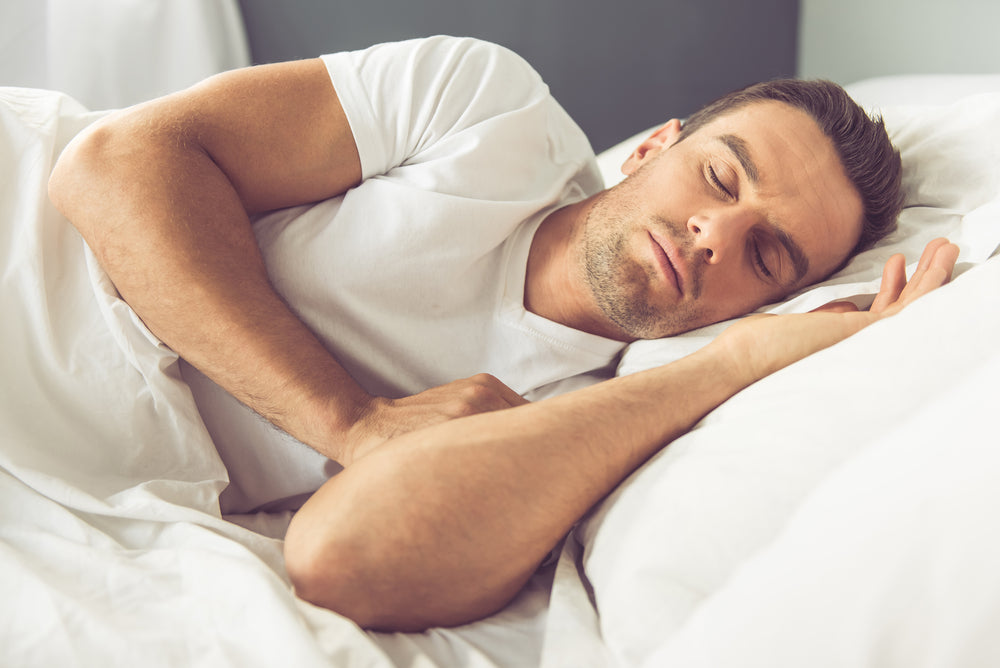Regardless of how much information exists online about ways to get a good night’s sleep, those suffering from even mild sleep apnea are having their sleep compromised by the disorder every time they lay down to rest. There really isn’t a cure for sleep apnea, especially if you are diagnosed with moderate or severe sleep apnea. However, there are a few home remedies you can try to alleviate some sleep apnea symptoms without a prescription.
Humidifiers
Humidifiers are a common household accessory that adds moisture to the air to help you breathe easier. Dry air can easily irritate your respiratory system, so adding some moisture to the air will help you breathe more clearly while also encouraging your sinuses to drain, removing blockages and facilitating better breathing.
While a humidifier by itself may be enough to help open up your airways, many will also suggest adding a few drops of essential oils into your humidifier’s reservoir. There are several oils with natural anti-inflammatory and/or soothing benefits, but you’ll want to try to find eucalyptus, peppermint, or lavender oils to help with sleep apnea symptoms. If you find this helps you sleep at night, be sure to carefully follow your humidifier’s care manual as dirty humidifiers can also add mold and bacteria into the air if not regularly cleaned.
Better breathing can help you stay in restorative sleep longer, but even these small gains can be undone by the long term side effects of untreated sleep apnea.
Lifestyle Choices
Perhaps one of the more difficult home remedies, you can endeavor to make serious changes to your lifestyle. Sleep apnea is often caused by being overweight and the extra pressure that excess skin and untoned muscles can put on your airways. Often, doctors will suggest a regular exercise regimen paired with a healthy diet. Once you’ve lost weight and the sleep apnea symptoms are alleviated or have subsided, you can move into a maintenance diet and exercise routine to stay at a healthy weight.
Other lifestyle changes may include decreasing your use of alcohol, cigarettes, or other sedatives. While a nightcap may sound like a good idea, it is actually making your sleep worse, especially if you drink to excess. Alcohol interrupts sleep quality and is a potent muscle relaxer that will cause excessive sagging in your mouth and throat muscles while you’re asleep. Other sedatives, like over the counter sleeping pills, can have a tranquilizing effect on muscles, increasing rather than decreasing your risk of apnea events. Similarly, smoking has an inflammatory effect on the airways, causing increased obstructions to the natural flow of air in and out of the body. While this can occasionally help alleviate symptoms, it isn’t a cure for sleep apnea and can lead to a false sense of security in your sleep quality.
Yoga
Much like any other holistic treatment, Yoga is helpful because it allows you to connect with your body in new ways. Because of the relaxation and tension relief that often happens during yoga practices, many yoga exercises can help reduce inflammation and help you open your airways--not to mention help you tap into your personal breathing patterns and rhythms. Yogic breathing techniques can help reduce your apnea. While there are many exercises you can find online, it is also helpful to consult a yoga instructor so they can help you find exercises for your individual breathing needs. Regular practice can help some of the symptoms of sleep apnea, like headaches and inflamed airways, but be wary about relying on this to solve your problem as sleep apnea is a serious medical condition that worsens if not treated.
Sleep positions
Of this list, changing your sleep position may be the most simple solution to your apnea symptoms but can also be the most difficult to regulate. Because many of us move during sleep, sleep position can be one of the more challenging sleep behaviors to change. Sleep apnea is most common in those who tend to sleep on their backs. During sleep, all your muscles relax and tend to sag, especially those in your mouth, throat, and chest. When sleeping on your back, this extra sagging obstructs the airway, causing blockages that inhibit your ability to breathe at night. Occasionally, this only results in snoring, but can worsen and turn into sleep apnea.
To alleviate some of your sleep apnea symptoms, try sleeping on your side or your stomach. This will allow the muscles to sag in directions that will cause fewer obstructions to your airways. There are special pajamas or pillows you can find online to help keep you in these new sleeping positions throughout the night. If you’re wanting to try it before committing to a product, we suggest placing a pillow in between your legs and laying on your side. The pillow will make it more challenging to roll over and lay on your back. Though side effects of sleep apnea, like snoring, can be helped by simple changes like your sleep position, they don’t erase the underlying causes of sleep apnea.
While home remedies are a good way to try and alleviate your sleep apnea symptoms, they are certainly not a cure and may only mask the condition. Because sleep apnea has no real cure, you need to be diligent about monitoring your condition with a sleep test. If you are diagnosed with sleep apnea, you’ll need to treat your condition with an AutoPAP machine or similar device. Whereas these home remedies are not always reliable, your AutoPAP machine is a prescription treatment that is specifically calibrated to your breathing, automatically adapting to give you incredible, uninterrupted sleep. Remember, home remedies are not often a real solution to serious medical problems that require consistent, prescribed treatment. If these or other home remedies are not working for you and you’re ready to start getting better sleep, contact us and we can help you explore your options for understanding your sleep condition and treatment options.

